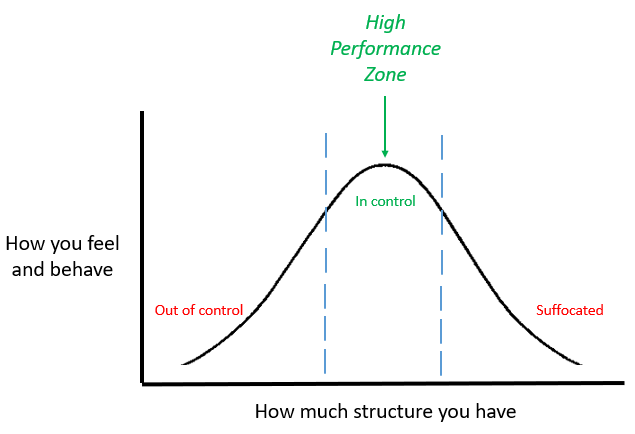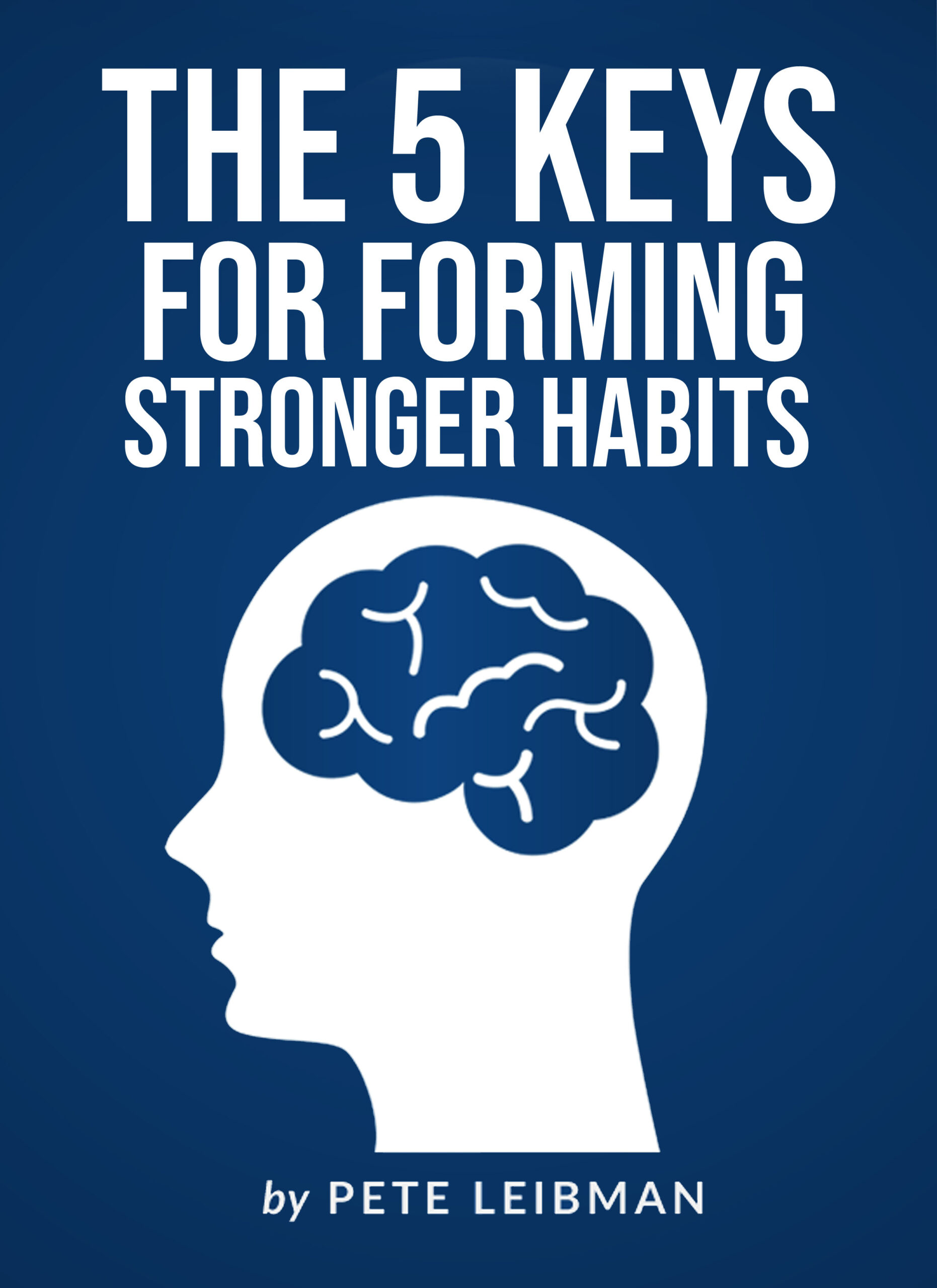
Imagine if there were no laws for driving.
In such a world, all of us would be able to drive in any lane, go as fast as we wanted, and race through intersections when we did not feel like stopping.
Consider the pandemonium that would result. Think of much better off you and everyone else is because of the various laws that we all follow on the road.
Unfortunately, a world with no driving laws is a good metaphor for the lack of boundaries around our habits these days. Drive-through restaurants and convenience stores provide us with easy, ubiquitous access to artificial “foods” that we are not built to consume. Smartphones and laptops allow us to work around the clock and from virtually anywhere in the world. Technology also allows us to be entertained for hours without moving.
In today’s world, you are surrounded twenty-four/seven by harmful or low-value temptations that keep you from being your best. Your body, your career, and your life will pay the price if you frequently give in to sources of immediate gratification.
In this article, you will learn a powerful strategy to overcome the endless supply of temptations that surround you: establish some Personal Policies.
What is a Personal Policy?
A Personal Policy is my term for a voluntary, self-imposed guideline that reinforces your long-term interests. These guidelines provide clear directions about what you do and what you do not do. As a result, you don’t have to waste time or energy deciding if, when, how much, or how often you can do something. Decide once on the policy. Then, follow it.
There are two kinds of Personal Policies. They can be:
- Complete: This means that you never do a certain behavior under any circumstances.
- Situational: This means that there are specific times or locations when you can do a behavior. Otherwise, you are not allowed to do the behavior.
What if you don’t like too much structure though?
While Personal Policies might seem restrictive, they are actually liberating.
Structure prevents chaos. True freedom comes from being in control of yourself, not from giving in and doing whatever feels good in the moment- which leads to problems in the future.
Without a reasonable number of Personal Policies, you will succumb more often to the endless temptations that exist these days. The world will control you, and you will not control yourself or your habits.
Of course, there is a point when too much structure becomes suffocating and de-motivating. However, many people move too far in the opposite direction. That’s like driving in a world with no rules for the road. Below is a visual depiction.

Examples of Personal Policies that are situational
My research and interviews for Work Stronger revealed that many high performers establish a variety of Personal Policies for themselves. Here are three situational examples:
- For using devices: Chip Bergh, president and CEO at Levi Strauss & Co., found that his family (him, his wife, and their eight-year-old daughter) was more focused on technology than each other during shared meals. So, his family established a policy in which they do not keep their devices at the table when they are eating together. This policy doesn’t mean they can never use their devices. It simply prevents them from using devices during meals.
- For drinking coffee: Sam Shank, CEO and co-founder at HotelTonight (the world’s leading hotel booking app), found that drinking coffee later in the day resulted in him staying up too late. So, he established a policy for himself, in which he does not drink caffeine after 12:00 p.m. 1 This policy doesn’t mean that Sam can never drink coffee. It simply prevents him from drinking coffee after 12:00 p.m.
- For using social media: Robin Thurston, CEO at Helix (a consumer genomics company), found that he was using his phone to spend too much time on LinkedIn, Twitter, and Facebook. So, he instituted a policy in which he can only visit those websites from his laptop. This policy doesn’t prevent him from ever using social media. It simply prevents him from using social media on his cell phone.
Examples of Personal Policies that are complete
Situational policies can be very effective. However, there are times when it is best to eliminate a behavior completely. In addition, you will often find 100% elimination to be easier than trying to limit the behavior to certain circumstances. Here are three examples of my Personal Policies that are complete. Each of these policies helped me eliminate a bad habit entirely from my life.
- For snoozing: I snoozed every day in college and for more than 10 years after college. It was one of my worst habits. (You can click here to learn why snoozing is so bad, how I stopped, and how you could break the habit too.) These days, I have a Personal Policy that I never snooze. Ever. I haven’t snoozed in years, and never plan to do it again.
- For drinking soda: I used to drink a ton of soda. As a college student, I often drank 24-36 ounces of Coca-Cola with each meal! Now, I view soda as poison. It’s just empty calories and artificial chemicals. These days, I have a Personal Policy that I never drink soda. Ever. I haven’t drank it in years and never plan to drink it again.
- For doing high-intensity exercise: I tore my hamstring a few years ago because I did not warm-up properly. That was the last time that I made that mistake. These days, I have a Personal Policy that I never do difficult exercise without warming up properly first. Ever. I have followed this policy for years as well.
Putting Personal Policies into Practice
While everyone would benefit from implementing all the Personal Policies shared in this article, they are simply meant as examples. You have to decide what policies will make sense for you.
You probably already have some Personal Policies for yourself, even though you might not label them that way. I challenge you to establish one more right now. It could be a complete policy or a situational one. Build these guidelines into your life one at a time.
When establishing a new policy, don’t just rely on willpower. Look below the surface and be clear about why you are establishing this policy. How will it improve your life?
In addition, be strategic, and ask yourself how you can remove the cues that currently entice you to do the behavior. For example, when Robin Thurston decided that he wanted to stop checking social media from his cell phone, he didn’t just try to rely on willpower. He deleted the apps off his phone. This is an excellent example of engineering your environment in a way that supports your desired behavior.
Summary and Final Thoughts
Structure prevents chaos.
You can either allow yourself to be controlled by our turbulent world, or you can take control of your behavior by establishing some Personal Policies. A reasonable amount of structure helps you form stronger habits more easily and makes change much easier.
As Jocko Willink and Leif Babin write in Extreme Ownership: How U.S. Navy Seals Lead and Win, “Discipline—strict order, regimen, and control—might appear to be the opposite of total freedom—the power to act, speak, or think without any restrictions. But, in fact, discipline is the pathway to freedom.” 2
P.S. If you enjoyed this article, you can share it by clicking a social media icon on this page.

Free eBook and Newsletter
Download my free 40-page eBook on “The 5 Keys for Forming Stronger Habits.”
You’ll also receive my free weekly newsletter on how to become your strongest self.
Your email is safe. Unsubscribe anytime.
About the author: Pete Leibman is the Creator of StrongerHabits.com. He is a best-selling author, keynote speaker, executive recruiter, athlete, and peak performance coach. His work has been featured on Fox News, CBS Radio, and CNNMoney.com, and over 500,000 people across the world have read his articles.
References for this article:
- Sam Shank, “How to Trick Yourself Into Becoming a Morning Person,” LinkedIn page, May 5, 2016, https://www.linkedin.com/pulse/how-trick-yourself-becoming-morning-person-sam-shank.
- Jocko Willink and Leif Babin, Extreme Ownership: How U.S. Navy Seals Lead and Win (New York: St. Martin’s Press, 2015), 274.

